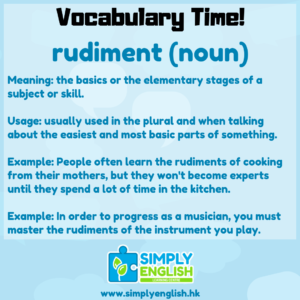
Meaning: the basics or the elementary stages of a subject or skill.
Usage: usually used in the plural and when talking about the easiest and most basic parts of something.
Example: People often learn the rudiments of cooking from their mothers, but they won’t become experts until they spend a lot of time in the kitchen.
Example: In order to progess as a musician, you must master the rudiements of the instrument you play.
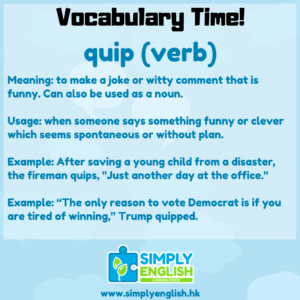
Meaning: to make a joke or witty comment that is funny. Can also be used as a noun.
Usage: when someone says something funny or clever which seems spontaneous or without plan.
Example: After saving a your child from a disaster, the fireman quips, “Just another day at the office.”
Example: “The only reason to vote Democrat is if you are tired of winning, ” Trump quipped.
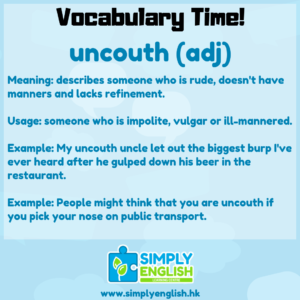
Meaning: describes someone who is rude, doesn’t have manners and lacks refinement.
Usage: someone who is impolite, vulgar or ill-mannered.
Example: My uncouth uncle let out the biggest burp I’ve ever heard after he gulped down his beer in the restaurant.
Example: People might think that you are uncouth if you pick your nose on public transport.
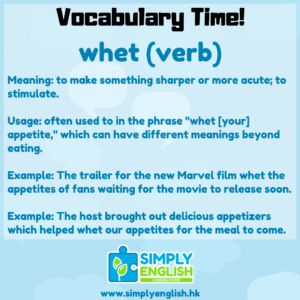
Meaning: to make something sharper or more acute; to stimulate.
Usage: often used in the phrase “whet [your] appetite” which can have different meanings beyond eating.
Example: The trailer for the new Marvel film whet the appetites of fans waiting for the movie to release soon.
Example: The host brought out delicious appetizers which helped whet our appetites for the meal to come.
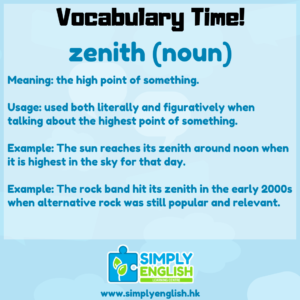
Meaning: the high point of something.
Usage: used both literally and figuratively when talking about the highest point of something.
Example: The sun reaches its zenith around noon when it is highest in the sky for that day.
Example: The rock band hit its zenith in the early 2000s when alternative rock was still popular and releavant.
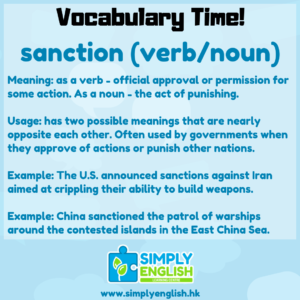
Meaning: as a verb – official approval or permission for some action. As a noun – the act of punishing.
Usage: has two possible meanings that are nearly opposite each other. Often used by governments when they approve of actions or punish other nations.
Example: The U.S. announced sanctions against Iran aimed at crippling their ability to build weapons.
Example: China sanctioned the patrol of warships around the contested islands in the East China Sea.
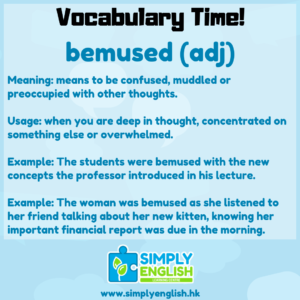
Meaning: means to be confused, muddled or preoccupied with other thoughts.
Usage: when you are deep in thought, concentrated on something else or overwhelmed.
Example: The students were bemused with the new concepts the professor introduced in his lecture.
Example: The woman was bemused as she listened to her friend talking about her new kitten, knowing her important finanacial report was due in the morning.
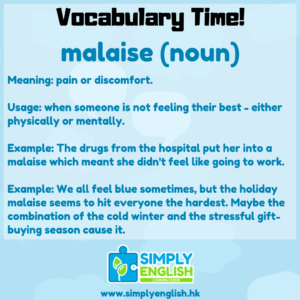
Meaning: pain or discomfort.
Usage: when somoene is not feeling their best – either physically or mentally.
Example: The drugs from the hospital put her into a malaise which meant she didn’t feel like going to work.
Example: We all feel blue sometimes, but the holiday malaise seems to hit everyone the hardest. Maybe the combination of the cold winter and the stressful gift-buying season cause it.
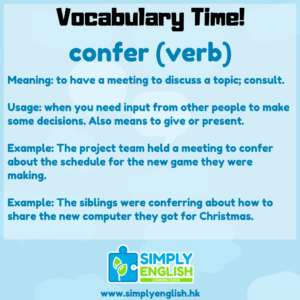
Meaning: to have a meeting to discuss a topic; consult.
Usage: when you need input from other people to make some decisions. Also means to give or present.
Example: The project team held a meeting to confer about the schedule for the new game they were making.
Example: The siblings were conferring about how to share the new computer they got for Christmas.
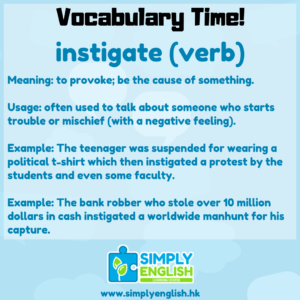
Meaning: to provoke; be the cause of something.
Usage: often used to talk about someone who starts trouble or mischief (with a negative feeling).
Example: The teenager was suspended for wearing a political t-shirt which then instigated a protest by the students and even some faculty.
Example: The bank robber who stole over 10 million dollars in cash instigated a worldwide manhunt for his capture.
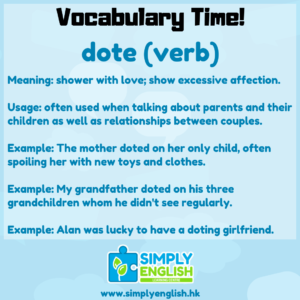
Meaning: shower with love; show excessive affection.
Usage: often used when talking about parents and their children as well as relationships between couples.
Example: The mother doted on her only child, often spoiling her with new toys and clothes.
Example: My grandfather doted on his three grandchildren whom he didn’t see regularly.
Example: Alan was lucky to have a doting girlfriend.
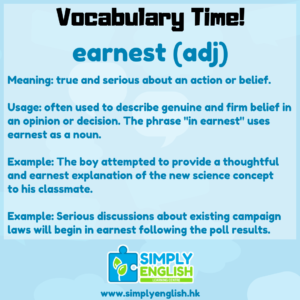
Meaning: true and serious about an action or belief.
Usage: often used to describe genuine and firm belief in an opinion or decision. The phrase “in earnest” uses earnest as a noun.
Example: The boy attempted to provide a thoughtful and earnest explanation of the new science concept to his classmate.
Example: Serious discussion about existing campaign laws will begin in earnest following the poll results.
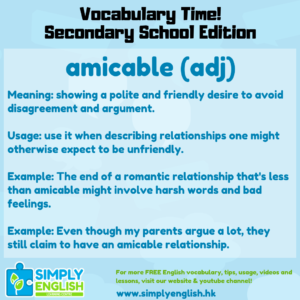
Meaning: showing a polite and friendly desire to avoid disagreement and argument.
Usage: use it when describing relationships one might otherwise expect to be unfriendly.
Example: The end of a romantic relationship that’s less than amicable might involve harsh words and bad feelings.
Example: Even though my parents argue a lot, they still claim to have an amicable relationship.
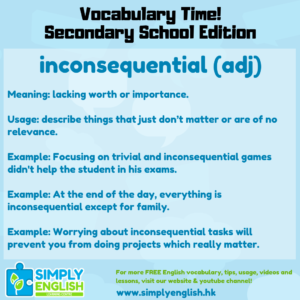
Meaning: lacking worth or importance.
Usage: describe things that just don’t matter or are of no relevance.
Example: Focusing on trivial and inconsequential games didn’t help the student in his exams.
Example: At the end of the day, everything is inconsequential except for family.
Example: Worrying about inconsequential tasks will prevent you from doing projects which really matter.
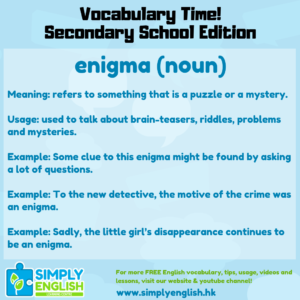
Meaning: refers to something that is a puzzle or a mystery.
Usage: used to talk about brain-teasers, riddles, problems and mysteries.
Example: Some clue to this enigma might be found by asking a lot of questions.
Example: To the new detective, the motive of the crime was an enigma.
Example: Sadly, the little girl’s disappearance continues to be an enigma.
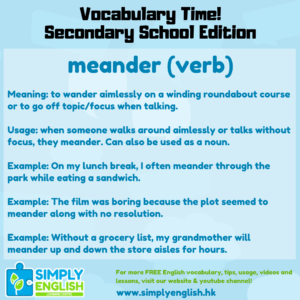
Meaning: to wander aimlessly on a winding roundabout course or to go off topic/focus when talking.
Usage: when someone walks around aimlessly or talks without focus, they meander. Can also be used as a noun.
Example: On my lunch break, I often meander through the park while eating a sandwich.
Example: The film was boring because the plot seemed to meander along with no resolution.
Example: Without a grocery list, my grandmother will meander up and down the store aisles for hours.
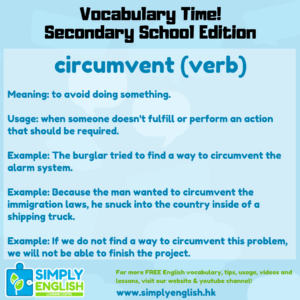
Meaning: to avoid doing something.
Usage: when someone doesn’t fulfill or perform an action that should be required.
Example: The burglar tried to find a way to circumvent the alarm system.
Example: Because the man wanted to circumvent the immigration laws, he snuck into the country inside of a shipping truck.
Example: If we do not find a way to circumvent this problem, we will not be able to finish the project.
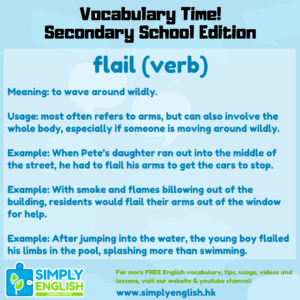
Meaning: to wave around wildly.
Usage: most often refers to arms, but can also involve the whole body, especially if someone is moving around wildly.
Example: When Pete’s daughter ran out into the middle of the street, he had to flail his arms to get the cars to stop.
Example: With smoke and flames billowing out of the building, residents would flail their arms out of the window for help.
Example: After jumping into the water, the young boy flailed his limbs in the pool, splashing more than swimming.

Meaning: really bad or offensive.
Usage: something that is egregious stands out, but not in a good way.
Example: If you make an egregious error during a championship football match, your coach might bench you.
Example: Unwilling to put up with misbehavior in her class, the teacher sent the egregious student into the hall.
Example: After cheating on the exam, Sarah was warned that further egregious violations would have her expelled from school.
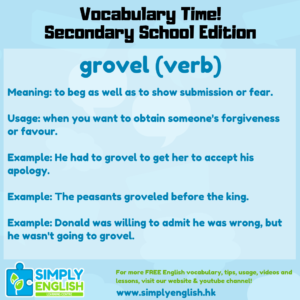
Meaning: to beg as well as to show submission or fear.
Usage: when you want to obtain someone’s forgiveness or favour.
Example: He had to grovel to get her to accept his apology.
Example: The peasants groveled before the king.
Example: Donald was willing to admit he was wrong, but he wasn’t going to grovel.
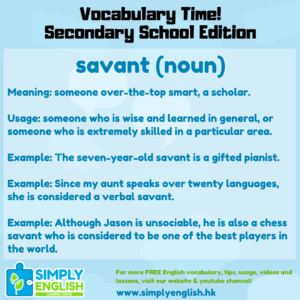
Meaning: someone over-the-top smart, a scholar.
Usage: someone who is wise and learned in general, or someone who is extremely skilled in a particular area.
Example: The seven-year-old savant is a gifted pianist.
Example: Since my aunt speaks over twenty languages, she is considered a verbal savant.
Example: Although Jason is unsociable, he is also a chess savant who is considered to be one of the best players in the world.
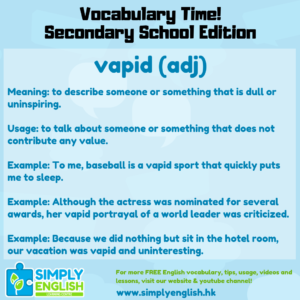
Meaning: to describe someone or something that is dull or uninspiring.
Usage: to talk about someone or something that does not contribute any value.
Example: To me, baseball is a vapid sport that quickly puts me to sleep.
Example: Although the actress was nominated for several awards, her vapid portrayal of a world leader was criticized.
Example: Because we did nothing but sit in the hotel room, our vacation was vapid and uninteresting.
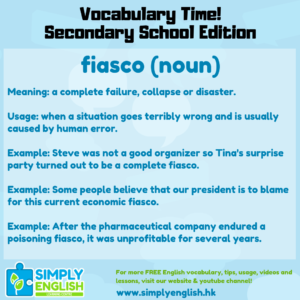
Meaning: a complete failure, collapse or disaster.
Usage: when a situation goes terribly wrong and is usually caused by human error.
Example: Steve was not a good organizer so Tina’s surprise party turned out to be a complete fiasco.
Example: Some people believe that our president is to blame for this current economic fiasco.
Example: After the pharmaceutical company endured a poisoning fiasco, it was unprofitable for several years.
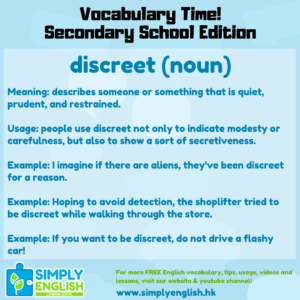
Meaning: describes someone or something that is quiet, prudent, and restrained.
Usage: people use discreet not only to indicate modesty or carefulness, but also to show a sort of secretiveness.
Example: I imagine if there are aliens, they’ve been discreet for a reason.
Example: Hoping to avoid detection, the shoplifter tried to be discreet while walking through the store.
Example: If you want to be discreet, do not drive a flashy car!
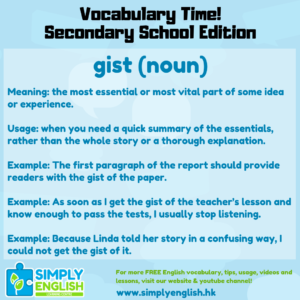
Meaning: the most essential or most vital part of some idea or experience.
Usage: when you need a quick summary of the essentials, rather than the whole story or a thorough explanation.
Example: The first paragraph of the report should provide readers with the gist of the paper.
Example: As soon as I get the gist of the teacher’s lesson and know enough to pass the tests, I usually stop listening.
Example: Because Linda told her story in a confusing way, I could not get the gist of it.
For more vocabulary lists, check these out!
Secondary School List #1
Secondary School List #2
Secondary School List #3
Primary School List #1
Primary School List #2
100+ Most Important Words – HKDSE
Tips for the English DSE
Need help preparing for the HKDSE? Check out our English DSE course!
Need help preparing for the IELTS? Check out our IELTS course!
